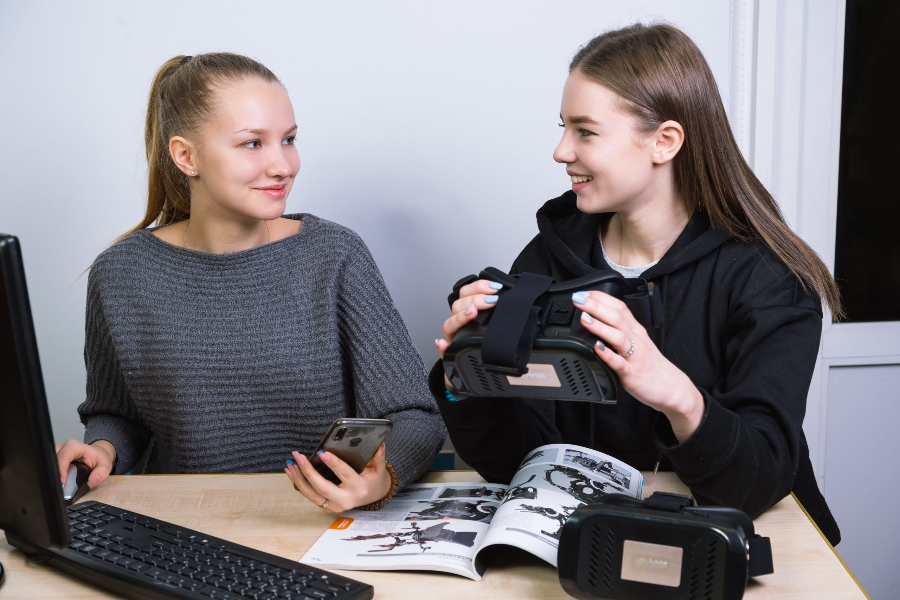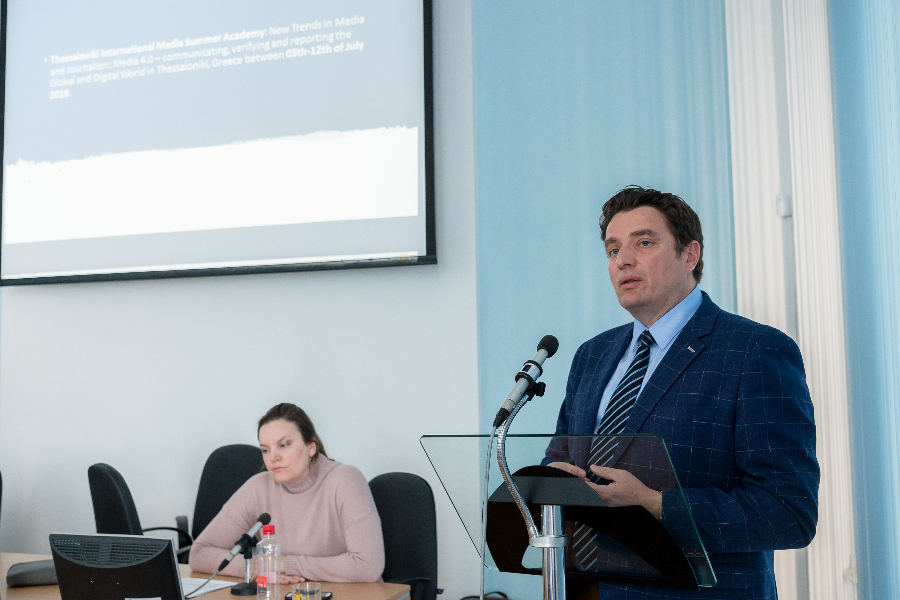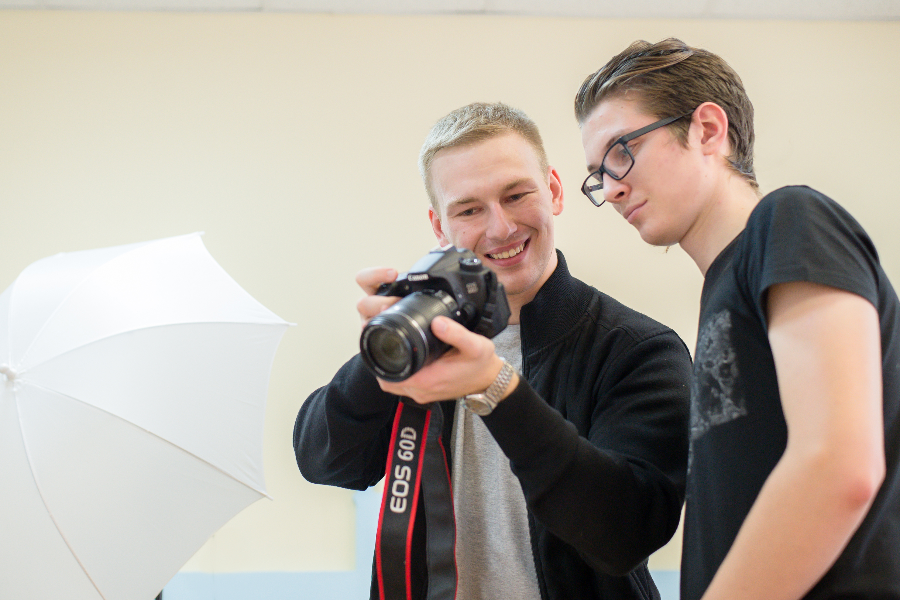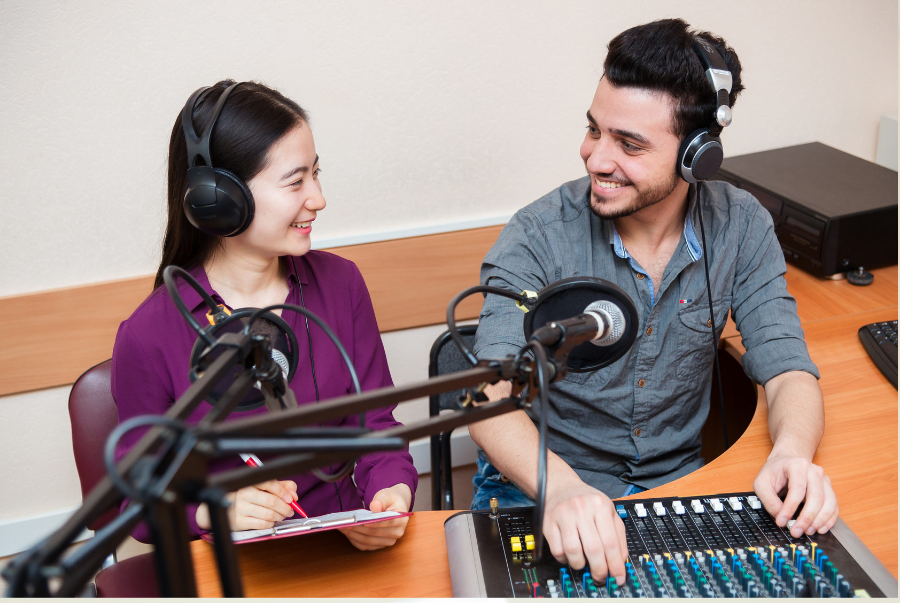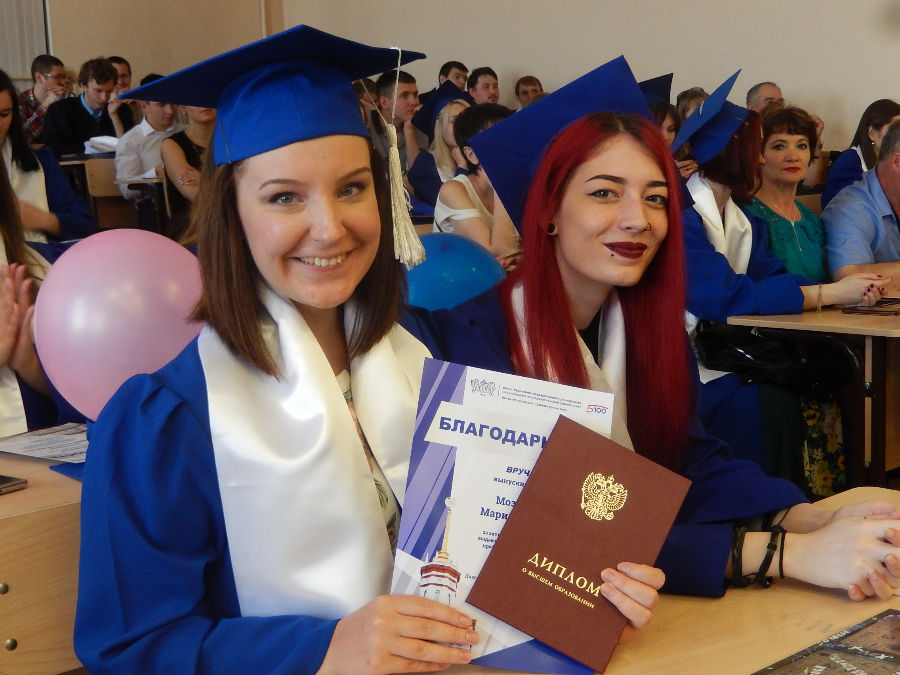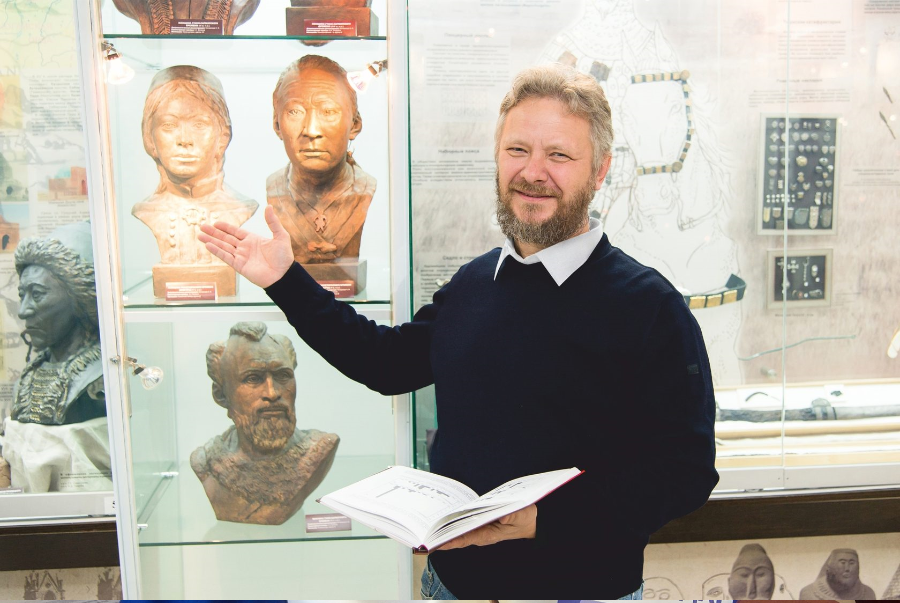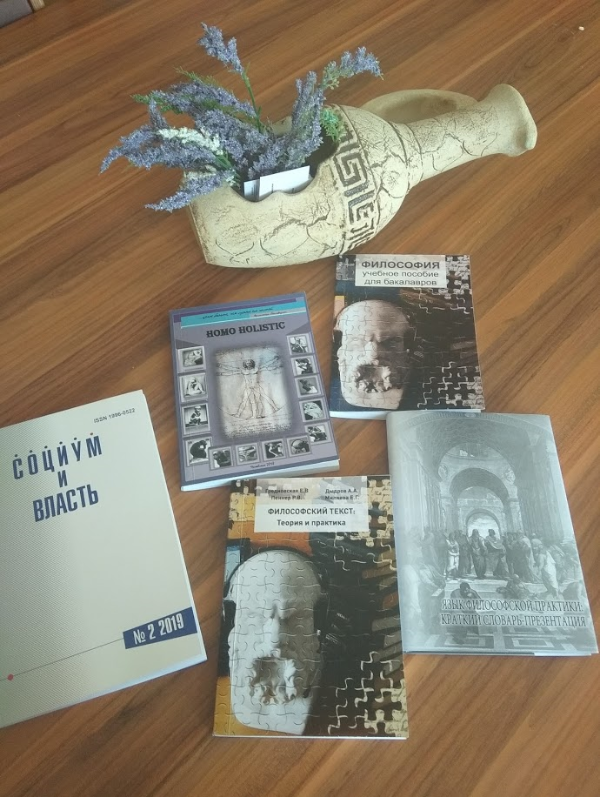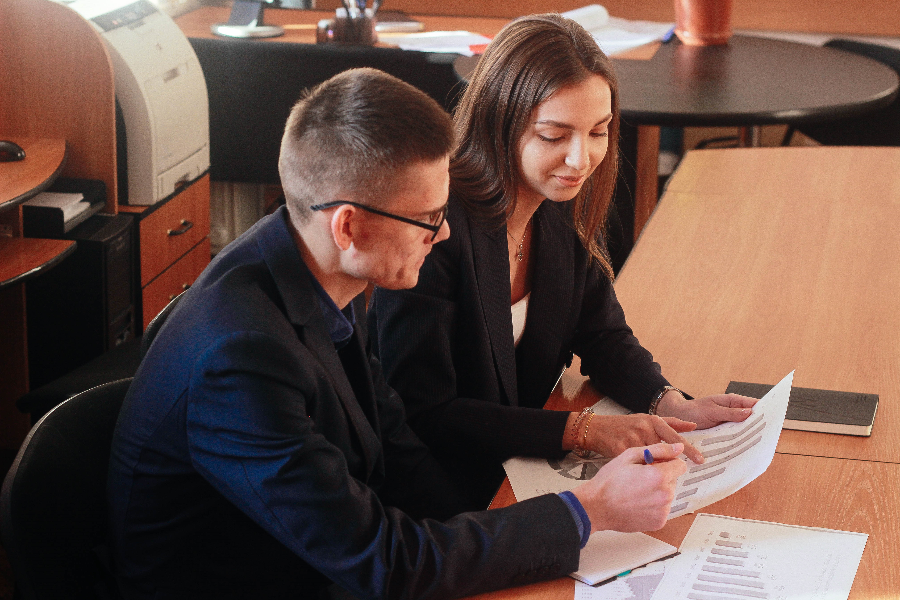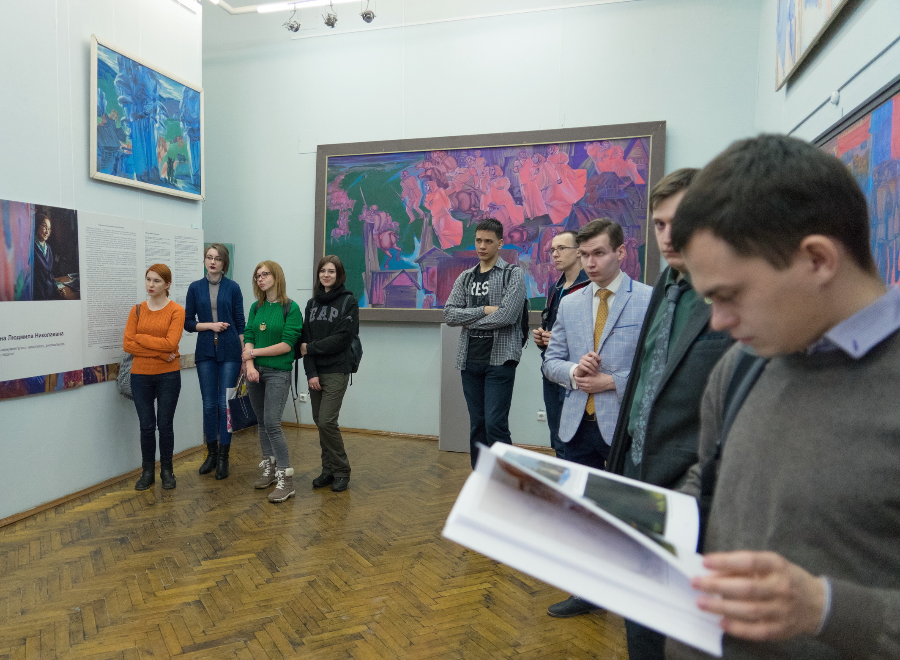The SUSU Institute of Media, Social Sciences and Humanities (IMSSH) gives applicants a precious opportunity to choose unique educational programmes, which provide fundamental knowledge and professional abilities, develop stable skills, and help to express personality through creativity.
Each educational programme of the Institute (be it in the field history or philology, journalism, advertising or public relations, art history, theology or sociology) reflects that human beings deeply relate to reality, and teaches how to make the world a better place.
“The Institute offers to gain multi-purpose competencies in the field of modern humanitarian knowledge, learn how to actively apply them in practice, and immerse oneself in the scientific and professional environment. The training is conducted using state-of-the-art laboratory base, facilitating the graduates becoming high-in-demand in the Russian and international labour market and building a successful career,” notes Lidiia Lobodenko, Director of the IMSSH, Professor of the Department of Journalism, Advertising and Public Relations, Doctor of Sciences (Philology), Member of the National Association of Mass Media Researchers.
Elite Training and Project-based Learning
The IMSSH offers programmes of elite training and project-based learning. The SUSU students have a unique advantage of studying in the formats of project-based and blended learning based on using cutting-edge digital and distance learning technologies. Already from their freshman years, students have a chance to participate in cross-disciplinary projects, create an individual educational path, obtain knowledge in several fields necessary for the fulfilment of projects, work in contact with the customers (major employers), and train in the latest online courses in addition to the main programme.
Project-based learning is a special type of educational activity. Different fields are studied not separately, but interconnectedly, and moreover, in the process of solving real problems, which means that knowledge is absorbed well and for a long time.
Within the framework of the project-based learning, the Institute simultaneously implements more than ten unique projects, each of them being a platform for solving the priority scientific and socio-humanitarian problems. For example, in the EUfactcheck International Journalism project, 20 leading European journalistic centres (members of the European Journalism Training Association) participate together with SUSU. The Public and Digital History historical and cultural project is aimed at creating a data bank of historical, cultural and sociocultural projects, necessary for the rebranding of the Chelyabinsk Region. The Virtual Museum of South Ural Writers project was created as part of the development of the Digital Philology field, to popularize the rich history of literature of our region.
Science
The Institute features such scientific and educational centres as the Centre for Cultural Studies; Cultural Theory and History Research and Education Centre; Eurasian Studies; SUSU-TV Television and Radio Company; SUSU Radio Station; 360-Degree Multimedia Newsroom; SMART University newspaper; Photography Studio; Computer Technologies in Mass Media Laboratory; Laboratory of Social Advertising and PR Projects; Theoretical and Applied Philology Teaching Laboratory; Teaching Laboratory of Empirical Sociology; international scientific Laboratory for Migration Studies; and Laboratory of Virtual Reality.
The modern laboratories allow students, by using the best equipment that meets international standards, to master the basics of transmedia journalism, acquire the skills of media planning, conducting creative PR campaigns, organizing historical, archaeological, sociological, philological research, and learn to understand philosophical doctrines and theology. All the graduates use digital technologies within the chosen profession, which is an absolute advantage in the labour market.
Students and postgraduates have the opportunity to participate in scientific conferences, in the organization of joint innovative international scientific projects with federal and international partners of the Institute.
International Collaboration
International collaboration is one of the priority directions of the IMSSH activity. It facilitates the broadening of international ties, the improvement of knowledge of students and the quality of the Russian education system.
The Institute collaborates with international associations, universities and academic staff around the world, conducts scientific, creative and educational projects jointly with international partners, participates in international conferences, creates scientific laboratories and research and educational centres, elaborates educational programmes in English, and implements programs of academic mobility.
Thanks to close collaboration with leading international and Russian scientific and educational centres, universities, as well as professional associations, the Institute of Media, Social Sciences and Humanities offers all the necessary conditions for developing programs of academic mobility and fulfilling ambitious projects.
Chose Your Profession
The Institute of Media, Social Sciences and Humanities comprises the departments of: Journalism, Advertising and Public Relations; Russian Language and Literature; Russian and International History; Theology, Culture, and Arts; Sociology; and Philosophy.
Department of Journalism, Advertising and Public Relations
For dozens of years this department has been training versatile media specialists in the conditions of a real university media production. For that purpose, the university provides all the types of mass media and media laboratories: SUSU-TV Television and Radio Company; SUSU Radio Station; SMART University newspaper; 360-Degree Multimedia Newsroom; unique world-class production complex Photography Studio, and International Laboratory of Virtual Reality.
Starting from 2016 the department has been actively representing SUSU in the European Journalism Training Association, which unites about 70 leading journalism schools in Europe. The department students participate in an Enterprise Promotion, a marketing communications project on the issues of promoting enterprises; in a FactCheck-Ecology cross-disciplinary educational project; and in an educational project called University in Transmedia Broadcast.
Every year the Department of Journalism, Advertising and Public Relations of the Institute of Media, Social Sciences and Humanities holds its "signature" events, such as Media PROFILE International Youth Congress on Advertising and Public Relations, or Media Planet contest and festival of school and student mass media, in which thousands of school kids and students from across Russia and many foreign countries take part.
The department students have many victories and achievements, including the ones at the international level.
Among the Bachelor's degree programmes there is an elite training programme, International Reporter School, which includes media trainings and master classes, advanced linguistic training, and the obtaining of a second speciality as a Translator in the Sphere of Professional Communications. Innovative Master's degree programmes are also being offered in: Media Communications (in English), and Transmedia Journalism (in Russian). Yet another programme, in Strategic Communications and Brand-building, is undergoing the licensing process.
In addition, among the department's advantages is the possibility to work in the International Laboratory of Virtual Reality intended for media projects creating and studying the interaction between mass media and audience in the virtual world; as well as to take internship in summer schools in foreign: Aristotle University, Greece; University of Antwerp, Belgium; Freiberg Mining Academy, Germany; or Czech Technical University in Prague, Czech Republic.
Department of Russian Language and Literature
If you choose to major in Philology at SUSU, you will be able to obtain modern philological education, which combines classical traditions and new digital competences. Today in the process of teaching the Philology students of the Institute of Media, Social Sciences and Humanities new up-to-date instruments are used, which have become available thanks to the trends in modern digital era. The new requirements for the competences include the ability to write, analyse and expert-review texts for web-sites, blogs, etc.; to study the visual components of texts; to create web-site content; and to fulfil virtual literary projects.
Students are provided with an unlimited access to the information database of the department, faculty, and university: they are free to use the services of the delivery desks, reading rooms, and electronic resources rooms of the SUSU Scientific Library, and the Theoretical and Applied Philology Teaching Laboratory.
In parallel to obtaining the main speciality, you can learn foreign languages starting from the first year of studies. Once you complete the language courses, you will be awarded a Diploma of higher education in the speciality of a "Translator in the Sphere of Professional Communications".
Students enjoy an opportunity to participate in annual special Philology projects: work of the editorial board of the SlavicumPress, an online journal of the Institute of Slavonic Studies at the University of Zurich; Akuly PеRа (News Tribe) business game; Divan, an online journal about literature and culture by philology students; Philology Games, a team game for senior school pupils and students; and SUSU Philology as the Philology of the Future, a project of the department's promotion and positioning. Projects become the basis for separate educational courses, and the material for defending the graduation qualification papers.
Besides the training process, the department is actively working on the aesthetic-education component. Students go to theatres and concerts, as well as organize, hold and attend evenings of poetry and meetings with the representatives of the arts community.
Over the course of studies the Philology students have a chance to apply the gained knowledge and skills in their educational training, internship and pre-graduation training.
It is possible to take internship at our city's PR services, press centres and records management offices of enterprises and organisations, at media-resources editorial offices, as well as at the leading institutions of secondary and vocational education, and at children's recreation camps.
Graduates can work in the fields of: publishing activity (editor, literary editor, proof-reader), literary activity (book critic, theatre critic, Literaturträger (bearer of literary culture as translated from German)), education and science (research fellow, teacher in a higher educational institution, teacher of Russian language and literature), or media and mass communications (copywriter, speechwriter, or content manager).
Department of Russian and International History
It was established in 2016 on the base of departments of history and of Russian history. Here, courses of universal history and Russian history are taught to the future historians, and Russian history ‑ to students of other faculties. In the educational process, much attention is paid to using modern information and multimedia technologies. The teaching staff includes holders of prestigious grants, in particular: grants by the Russian Science Foundation, and the Russian Foundation for Basic Research. Methodological and study guides are being published on a regular basis.
The department students actively participate in the work of the Youth Historical Society. The Chelyabinsk Regional Youth Branch of the Russian Historical Society, created at the Department of Russian and International History of the SUSU Faculty of History a while back, aims at forming a unified historical space for the historians of our city and region, at fulfilling the educational mission among young people, and at promotion of the historical knowledge and patriotic education through holding scientific seminars and conferences.
Department of Philosophy
At present, the activities of the department are determined by the objectives of Project 5-100 in the framework of the scientific field of “Philosophical Practice”. The staff of the department performs comprehensive joint research (at the intersection of several fields: philosophy of science, philosophy of engineering, philosophical anthropology and philosophy of education), dedicated to the analysis of the translation of philosophical knowledge in the post-modern cultural space. Since 2016, the department has been implementing the international scientific field of “Philosophical Practice” in Russia. In 2017, as part of the scientific field, two scientific clusters of its implementation were identified: “Philosophical Practice in Education” and “Philosophical Practice in Science”.
Within the framework of this field, active work is being carried out in the sphere of international cooperation (joint projects with foreign scientists, the translation of scientific publications in the chosen field, participation in international conferences, seminars and retreats on philosophical practice and problems of metrology in the social humanities). The success of this field was confirmed by the Russian Foundation for Basic Research grant support and the election of Russia as the venue for the 16th International Conference on Philosophical Practice, what happened in Mexico City in 2021. Active preparations are being carried out for this event, which will be held in St. Petersburg and will be attended by the representatives of 15 countries. In the structure of the Institute of Media, Social Sciences and Humanities, a Practical and Applied Philosophy Research and Education Centre has been created, the task of which is to apply fundamental philosophical knowledge in solving the real problems of society, in creating scientific products based on integrated research that needs ethical and social and humanitarian expertise. The department has organized the work on the preparation and the annual publication of the collection of scientific articles “Homo Holistic: a Holistic Person”, with registration in the Russian Science Citation Index database, intended for the scientific publications of the Bachelor’s and Master’s degree students, and postgraduates. SUSU co-publishing with the RANEPA of the journal “Society and Power” (peer-reviewed by the Higher Attestation Commission) with its transfer to an electronic platform in the structure of the IODE and a further prospect of promotion in Scopus has been implemented.
Within the framework of Project 5-100, at the stage of implementation of the SUSU development and transformation strategy, one of the strategic fields is the “Ecology”, in the section “Technology of Humanitarian Ecoengineering” (activity vectors: “Formation and promotion of the image of the Chelyabinsk Region”, “Development of educational practice and technology aimed at the formation of the youth’s ecological worldview”, “Development of career guidance and patriotic practice and technology”). The interdisciplinary working group, represented by the employees of the departments of the Institute of Media, Social Sciences and Humanities: the Department of Philosophy and the Department of Journalism, Advertising and Public Relations, as well as the Department of Developmental Psychology and Age Counselling, together with partners: the State Duma Committee on Ecology and Environmental Protection, the Public Chamber of the Chelyabinsk Region, PAO Mechel, the representatives of the regional branch of the Russian Philosophical Society (scientists from SUSU, CSU, CSIC, UPPP) develops verbal and non-verbal technologies of environment design of consciousness. Their application was presented in the activities of the environmental regional forum “Ecoengineering 1.0” (February, 2019) and “Ecoengineering 2.0” (December, 2019). The bilingual informational and introductory dictionary “Ecology of Human Being” has been published.
The Department of Philosophy implements an annual project dedicated to the international celebration of the Day of Philosophy, which brings together students, Master’s degree students, postgraduates, and teaching staff of the university. To attract the public to the study of the philosophical problems of the social, political and cultural life of modern society, the Philosophical Cafe has been operating since 2017, where you can learn practices of the team “philosophical counselling”. In 2019, the philosophical club “Lantern and Barrel” was created for the creative cooperation of students and teachers outside the classroom.
Department of Sociology
Sociology is a unique modern subject, since its research methods are at the intersection of the humanities and mathematics. The study of sociology is impossible without an understanding of the laws of psychology, cultural studies, anthropology and economics.
A modern sociologist is a polymath who is equally good at mastering the skills of mathematical calculations and methods of research of the institutions of the family, education, and the interaction of the society and culture. Consequently, the scope of sociological knowledge is very wide: in particular, it covers the study of economic relations, gender relations, ethnic and religious conflicts, processes of organizing the life of society, including observations of the life of the community.
Sociology is one of fields of the humanities being taught at the SUSU Institute of Media, Social Sciences and Humanities. The students of the Institute can implement their abilities in two main fields: in theoretical science - in the study of social processes, and in the applied sphere - in predicting these processes, and making practical recommendations.
The Department implements a Bachelor's degree programme in the field of “Sociology”, that is a four-year full-time study on a state-financed or a contractual basis.
A Sociology graduate can work in the state and municipal authorities, production and analytical services of the companies of various sectors as a sociologist, marketing specialist, targeting specialist, and a manager; in centres for the study of public opinion, advertising and marketing agencies, consulting companies, the mass media, and the publishing business as an analytical sociologist.
The second stage of education is implemented at the Department according to the Master's degree programme "Integrated Social Analysis", which involves training on a contractual basis for two years in a full-time mode of study, or two and a half years in a part-time mode of study.
The department implements a project-based learning program, within the framework of which every student carries out his/her own project that is a sociological study on a relevant topic, during which he/she gains the skills to develop a research program, tools, and of practical work on statistical data collecting, analyzing and processing.
The main employers of the graduates of the Department are the following: the marketing and sociological research agency “MarS”; Lite-Group Marketing Research Agency, marketing and advertising departments of the Fiesta and Raduga shopping malls, the marketing department of RBT.ru, Unium educational centre, MKU Centre for National Unity.
If you choose the field of “Sociology” at the SUSU Institute of Media, Social Sciences and Humanities, you will receive wide opportunities for professional self-fulfilment in various fields. Both the humanist and the student with a mathematical mindset will be able to find an occupation to his/her liking at the department.
Department of Theology, Culture and Arts
The department offers training in general professional and special courses as part of the Bachelor’s degree programmes in "Theology", Bachelor’s and Master’s degree programmes in "History of Arts", as well as training in the courses of "Culture Studies" and "History of World Religions" at various faculties of SUSU.
In the framework of the field of “Theology”, in addition to general educational courses, an extensive set of professional disciplines and those associated with Orthodox art is taught. At the same time, students receive knowledge on the history and culture of other faiths, on state-confessional relations, and also on the role of Orthodoxy in modern society. The activities of the department, as a graduating department of art historians, include teaching the history of the world and national culture, the theory of culture and art, practical training and guidance on the practical training in museum funds, exhibition halls, libraries and archives.
A postgraduate programme in Art History (specialty "Visual Arts, Crafts and Architecture") has been opened, in which the most talented graduates will be able to continue their professional training.
The department has specialized classrooms, including: a training laboratory for practical lessons, equipped with multimedia facilities; Art Museum, Information and Education Centre "Virtual Branch of the Russian Museum" (Pushkin Hall).
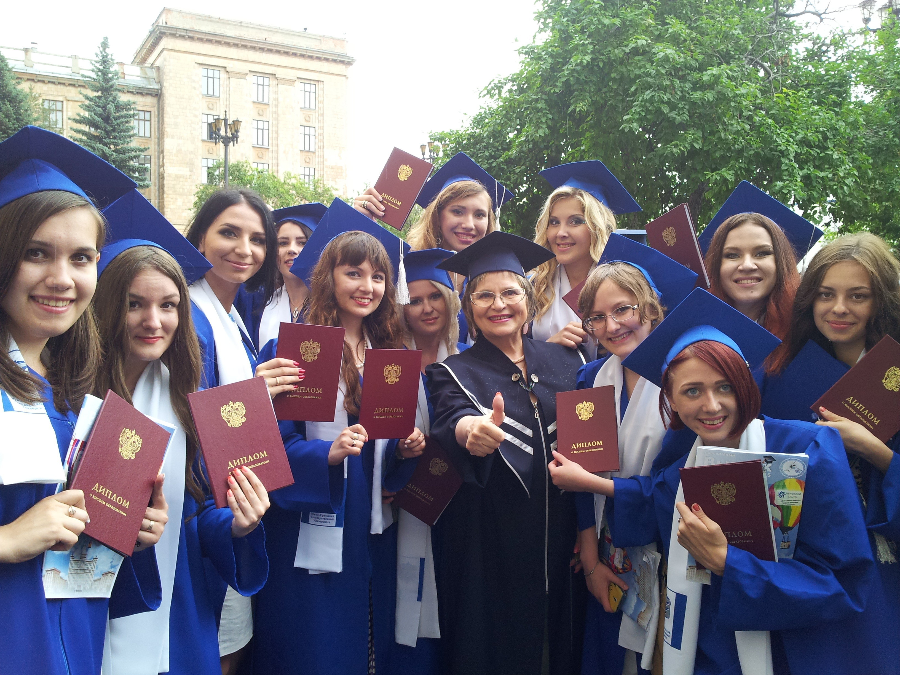
Availability of state-financed places
Bachelor’s degree programme:
- Sociology – 19;
- Advertising and Public Relations – 4;
- Journalism – 7;
- Philology – 4;
- History – 16.
Master’s degree programme (full-time):
- Journalism – 5;
- Philology – 7;
- History – 8.





.png)
